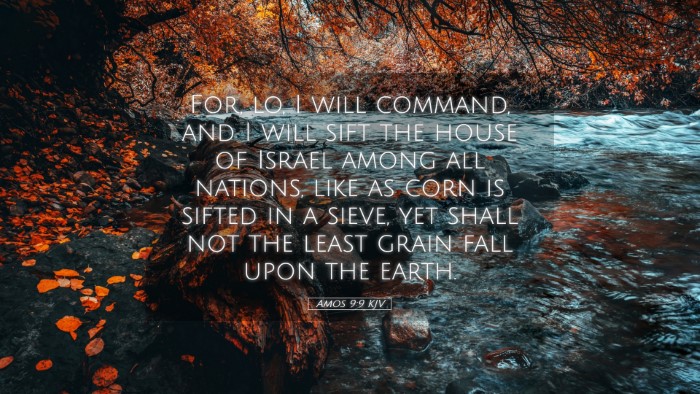Old Testament
Genesis Exodus Leviticus Numbers Deuteronomy Joshua Judges Ruth 1 Samuel 2 Samuel 1 Kings 2 Kings 1 Chronicles 2 Chronicles Ezra Nehemiah Esther Job Psalms Proverbs Ecclesiastes Song of Solomon Isaiah Jeremiah Lamentations Ezekiel Daniel Hosea Joel Amos Obadiah Jonah Micah Nahum Habakkuk Zephaniah Haggai Zechariah MalachiAmos 9:9
Amos 9:9 KJV
For, lo, I will command, and I will sift the house of Israel among all nations, like as corn is sifted in a sieve, yet shall not the least grain fall upon the earth.
Amos 9:9 Bible Commentary
Commentary on Amos 9:9
Amos 9:9 states, "For behold, I will command, and I will sift the house of Israel among all nations, as corn is sifted in a sieve, yet shall not the least grain fall upon the earth." This verse encapsulates the prophetic imagery that underpins the entire book of Amos, conveying both judgment and restoration.
Contextual Background
The prophet Amos, a shepherd from Tekoa, was chosen by God during a time of great prosperity for Israel; however, it was a prosperity laced with injustice and idolatry. Chapters 1-6 emphasize God's judgment upon Israel and the surrounding nations, while 7-9 portray visions of impending destruction. Yet, within this framework of judgment lies a promise of hope and restoration, culminating in Amos 9.
Exegesis of the Text
In Amos 9:9, the act of sifting represents God's divine judgment. Sifting is a process where unwanted elements are separated from the desired grain—here, the Lord distinguishes between the faithful remnant and the unfaithful.
- God’s Sovereignty: The phrase “I will command” highlights God's authority over all nations, establishing that His will is irresistible.
- The House of Israel: This term encapsulates both the Northern Kingdom of Israel and the Southern Kingdom of Judah. It signifies a collective identity of God's chosen people.
- The Sifting Process: This metaphor of sifting indicates both judgment and divine selection. Just as a farmer carefully examines the grain, God attentively discerns who will remain and who will be discarded.
Interpretation by Notable Commentators
Matthew Henry: In his commentary, Henry emphasizes that God’s sifting will not lead to the loss of the faithful remnant. He notes that though the judgment may appear severe, it is purposeful. Only the “least grain” falls to the earth, indicating God’s preservation of the faithful. Henry’s insight encourages readers to view God’s judgment through the lens of His mercy.
Albert Barnes: Barnes notes the significance of the nations. His commentary suggests that this sifting is not limited to Israel alone, but extends to the Gentile nations as God brings all people into account for their actions. This wider scope affirms God's authority over the entire earth. Barnes stresses that God’s sifting will ultimately result in the purification of His people.
Adam Clarke: Clarke interprets the sifting metaphor as reflecting God’s investigative judgment, likening it to a farmer who removes chaff from grain. He expresses that this divine scrutiny prepares a prepared people ready to receive God's blessings in the new covenant promises. Clarke’s insights underline the transformative aspect of God’s judgment, moving towards purification and hope.
Theological Implications
This verse presents profound implications for contemporary readers. It calls for self-examination among believers, mirroring the scrutiny that God applies to His people. The notion of being sifted should inspire humility and resilience, as it denotes a preparation for the greater purpose God has for His people.
Additionally, the inclusion of the phrase “yet shall not the least grain fall upon the earth” serves as an assurance of God’s providential care. It affirms that no one who belongs to God will be lost in the process of judgment; His covenant faithfulness guarantees the preservation of His remnant.
Applications for Pastors and Students
As pastors and teachers grapple with this text, there are several critical applications to consider:
- Emphasizing Judgment and Grace: A balanced approach should be taken when teaching on the judgments of God—the focus should not solely be on condemnation but should highlight God’s desire for repentance and restoration.
- Encouraging Faithfulness: This text challenges believers to remain steadfast in their faith, assuring them that their labor will not be in vain and that God is intimately aware of their struggles.
- Understanding God’s Sovereignty: The narratives in the scriptures must continually affirm that God is sovereign over nations and personal lives, guiding their paths toward His redeeming purpose.
Conclusion
Amos 9:9 stands as a pivotal verse that encapsulates the dual themes of judgment and hope. As we reflect upon God’s sifting, we are reminded of His holy fidelity and His commitment to the sanctification of His people. For theologians and scholars, this verse offers rich material for understanding the dynamics of divine justice and mercy, urging us to live lives that reflect God's goodness amidst judgment. The fulfillment of these promises culminates in Christ, who sustains and redeems the faithful grain of His people.


